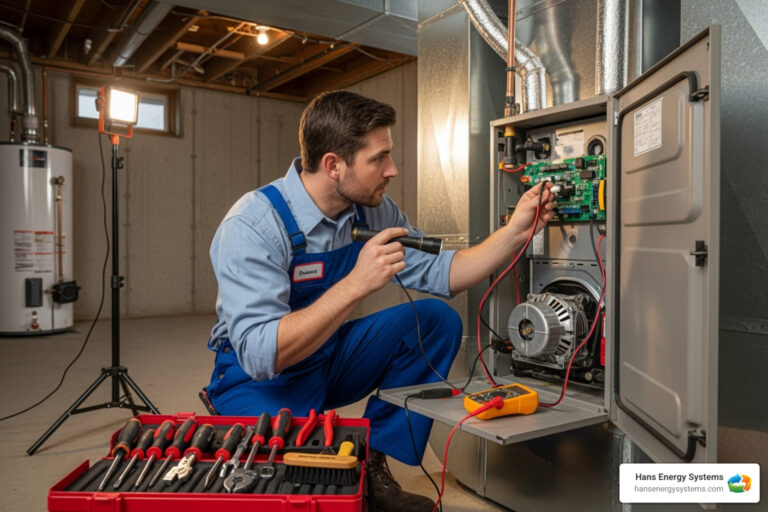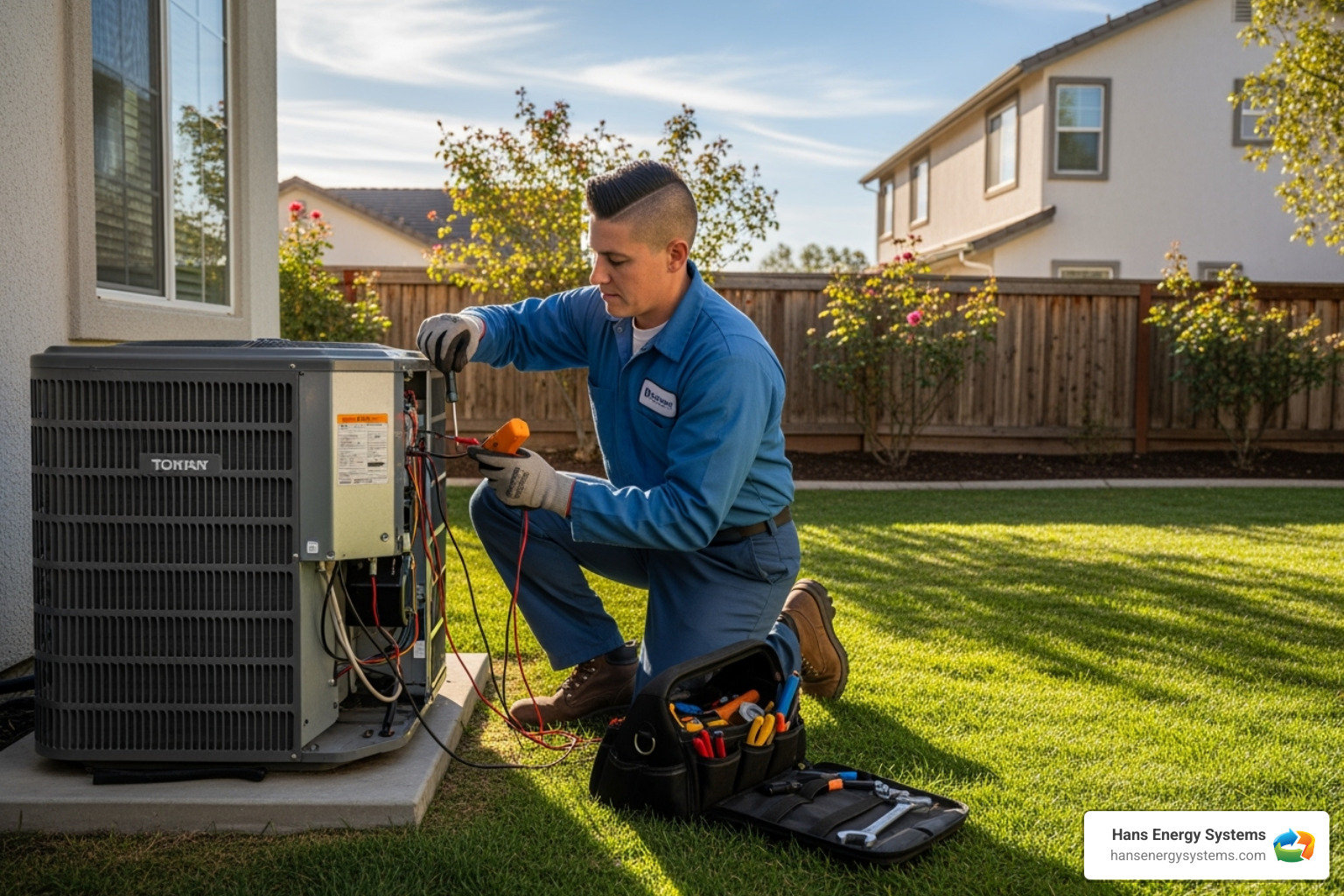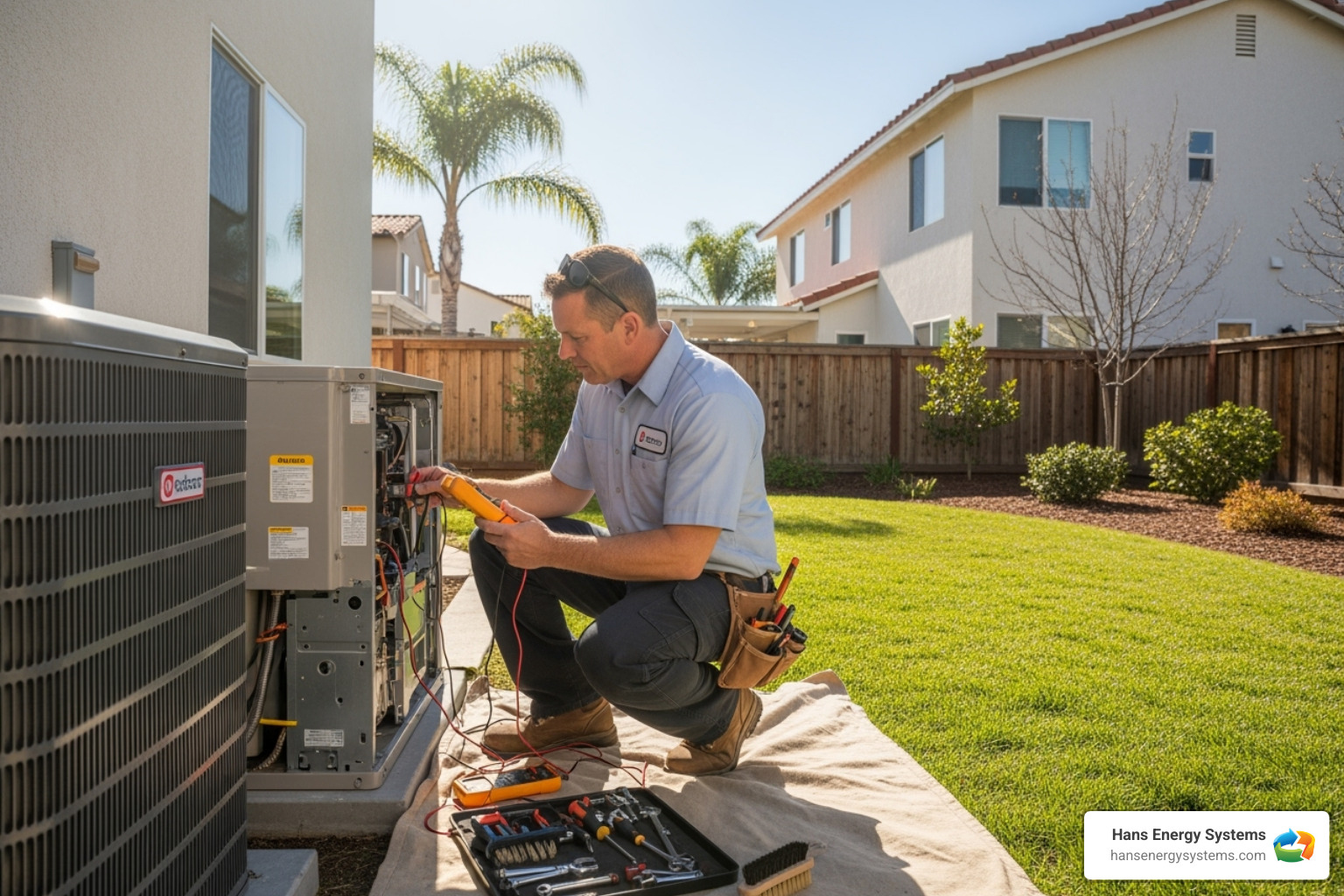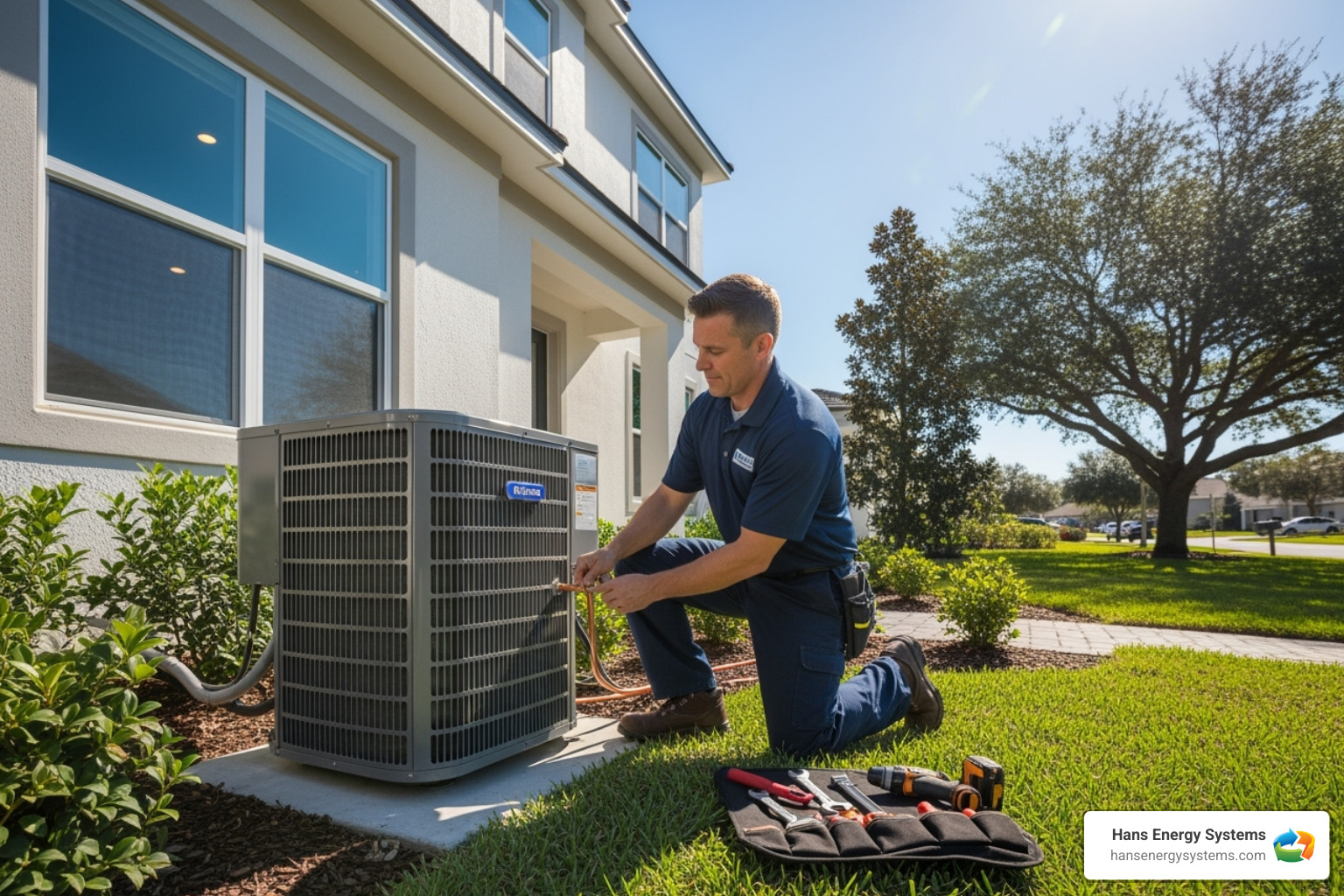Why Your Home’s Heating System Deserves Expert Attention
When you need heating repair, you want a solution that works the first time. A furnace that won’t start on a chilly evening or a heat pump blowing cold air can quickly disrupt your family’s comfort.
Common signs you need heating repair:
- Strange noises like banging, scraping, or grinding
- Uneven heating throughout your home
- Rising energy bills despite normal usage
- System cycling on and off frequently
- Cool or cold air coming from vents
- Burning or gas odors when the system runs
Your heating system is a hard-working piece of equipment. Whether you have a 15-year-old furnace or a newer system, knowing when to call for professional help can save you money and prevent bigger problems. Most heating issues stem from lack of maintenance, worn components, or simple fixes like dirty filters. However, some repairs require professional expertise to ensure your family’s safety and your system’s long-term reliability.
The average lifespan of most furnaces is 15 years, but proper maintenance and timely repairs can extend that considerably. While minor repairs are common, full system replacement becomes the smarter choice when repair costs exceed half the value of a new unit.
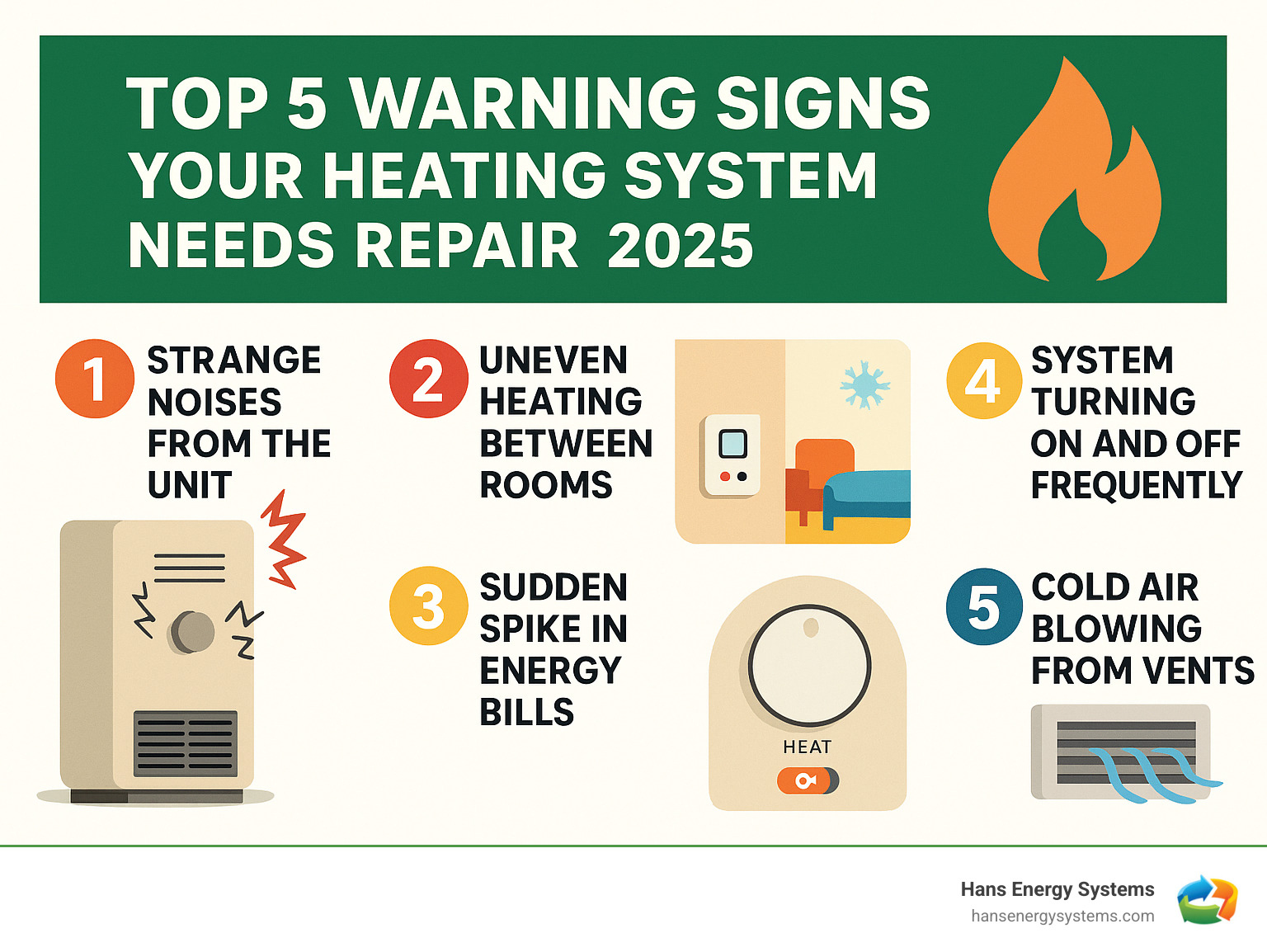
Heating repair terms explained:
Is Your Heater Ailing? Common Signs and Causes
This section identifies the symptoms and root causes of heating system failures, helping you diagnose the problem before you call a professional.
Telltale Signs Your Heating System Needs Repair
If your heating system starts making strange noises or heating your home unevenly, it’s sending a clear signal that it needs attention. These aren’t quirks to ignore—they’re your system’s way of crying for help.
- Strange noises like scraping, banging, or grinding often signal mechanical problems that will only get worse with time.
- Uneven heating points to issues with air distribution, such as ductwork problems or a struggling blower motor.
- Rising energy bills without increased usage mean your system is working overtime to maintain comfort.
- Frequent cycling (turning on and off repeatedly) wastes energy and stresses components.
- Blowing cool or cold air can stem from simple thermostat problems to more complex mechanical failures.
- Unpleasant odors, such as burning or gas smells, require immediate attention for safety reasons.
- Poor indoor air quality, like increased dust, can also signal that your system needs professional care.
For a deeper dive into these warning signs, check out our comprehensive guide on Signs You Need Heating Repair in Poway.
Understanding Different Heating Systems and Their Issues
Each heating system type has its own common issues. Understanding your system helps you spot potential problems early.
- Furnaces use gas or electricity to heat air. Common issues include a faulty igniter, a bad sensor, or a simple clogged filter, which can shut down the entire system.
- Heat pumps provide both heating and cooling. They are prone to refrigerant leaks and compressor failure, and are particularly sensitive to maintenance neglect.
- Boilers use hot water or steam. They can suffer from pressure loss or kettling (a rumbling sound from limescale buildup) that requires professional attention.
- Ductless mini-splits offer targeted heating but can experience issues with their indoor or outdoor units, often related to electrical components or refrigerant problems.
Each system requires different expertise for proper heating repair. Our team understands the nuances of every system, as detailed in our guide on Heating Problems and Solutions in Poway.
The Root Causes of Heating Malfunctions
Most heating problems stem from a few common culprits:
- Lack of maintenance is the primary one. Skipping annual tune-ups allows minor issues to become major headaches.
- Normal wear and tear is inevitable. Over time, components like motors and fans wear down and require attention.
- Dirty filters are the most common and preventable cause of problems. A clogged filter restricts airflow, causing the system to struggle and overheat.
- Thermostat failure can make a perfectly good system seem broken if it can’t read temperatures or communicate correctly.
- Electrical issues, like faulty wiring or tripped breakers, can prevent your system from starting or cause erratic behavior.
- Pilot or ignition control problems are common in gas systems and prevent the unit from creating heat.
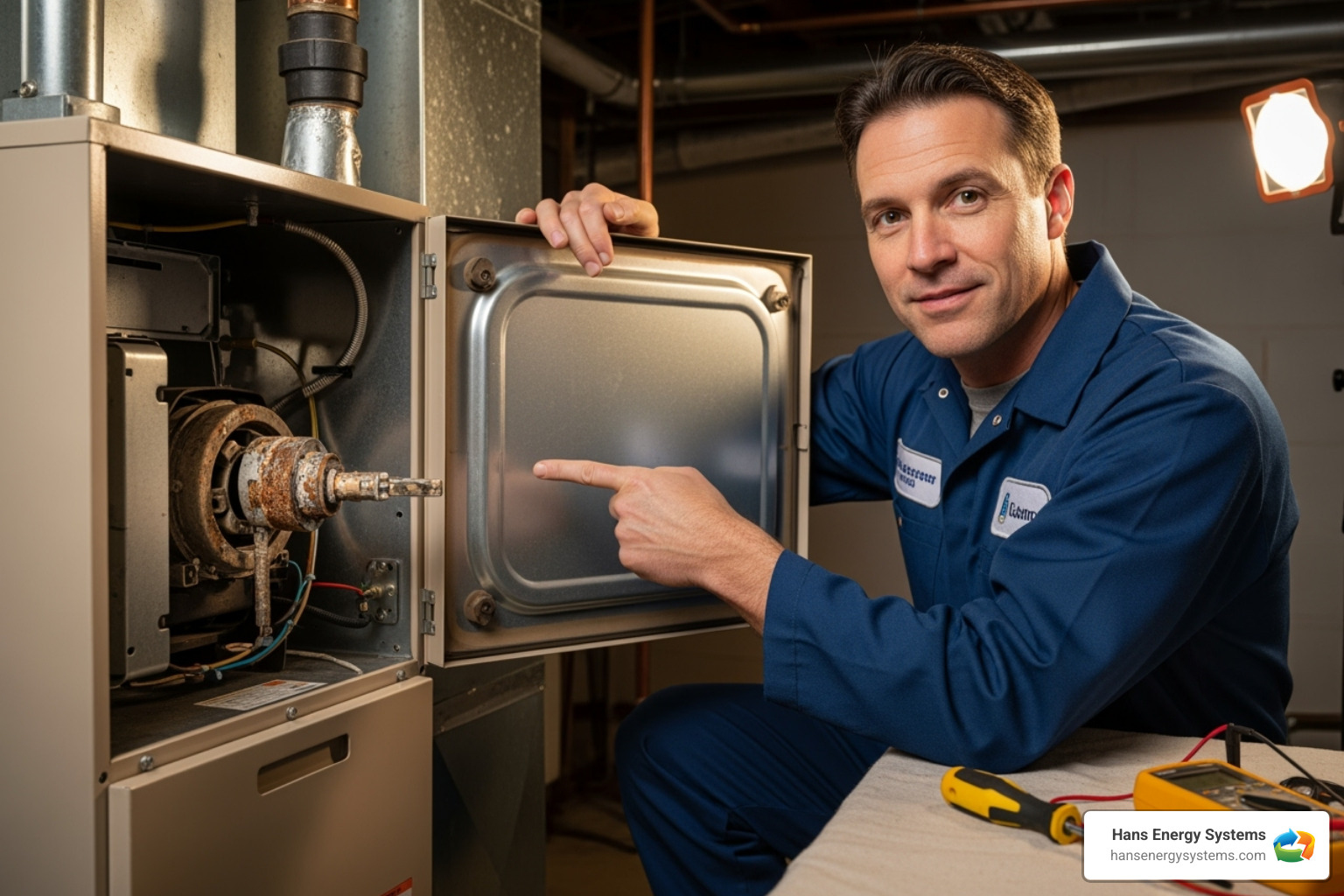
Understanding these root causes helps you make informed decisions about maintenance and repairs, saving you money and preventing discomfort.
The Critical Choice: Repair vs. Replacement
Deciding whether to repair your existing unit or invest in a new one is a major decision. This section breaks down the key factors to consider.
Key Factors in the Repair or Replace Decision
When your heating system acts up, you face a tough question: fix it or replace it? The answer depends on a few key factors.
- System age is a primary consideration. With an average 15-year lifespan, repairing an older system may only be a temporary fix.
- The frequency and cost of repairs are telling. If you’re constantly calling for service, replacement may be more cost-effective.
- Rising energy consumption is another red flag. If your utility bills are climbing, your aging system is likely losing efficiency.
- Overall system performance matters. If your unit struggles to heat your home evenly or makes excessive noise, it may be time for an upgrade.
For more detailed guidance on making this important decision, check out our resource on Heating Replacement Necessary in Poway.
When is Heating System Replacement the Smarter Move?
Sometimes replacement isn’t just an option—it’s the smartest financial move. Here’s when investing in a new system pays off:
| Feature | Repairing an Old Furnace | Replacing with a New Furnace |
|---|---|---|
| Initial Cost | Lower (for single repair) | Higher |
| Long-term Cost | Potentially higher due to frequent repairs, rising energy bills | Lower due to improved efficiency, fewer repairs |
| Efficiency | Decreasing, potentially very low | High, with modern energy-saving features |
| Reliability | Declining, increased risk of unexpected breakdowns | High, new warranty coverage |
| Comfort | May struggle with even heating, noise | Consistent, quiet operation, improved indoor air quality |
| Lifespan | Limited extension, still nearing end of life | New 15+ year lifespan |
| Technology | Outdated, lacks smart features | Advanced controls, smart thermostat compatibility |
Replacement is the clear choice when repair costs exceed 50% of replacement value. At that point, you’re investing heavily in a system that will likely need more repairs soon.
If your system is over 15 years old, you’re in overtime territory. Modern systems offer dramatically better energy efficiency that can significantly cut your heating bills. An improperly sized system—too big or too small for your home—will never perform optimally and should be replaced with a correctly sized unit.
The desire for higher energy efficiency alone can justify replacement, as the monthly savings can offset the investment over time. We consider all these factors to give you honest guidance on whether a heating repair makes sense or if replacement is your best bet.
To understand the replacement process step by step, visit our guide on Steps for Heating Replacement in Poway.
Understanding the Costs of Professional Heating Repair
Get a clear picture of what to expect financially, from minor fixes to major replacements, and learn what factors influence the final price.
What to Expect on Your Heating Repair Bill
Heating repair costs vary based on the problem, from minor fixes to major investments. Understanding what to expect can help you budget accordingly.
- Minor repairs cover issues like thermostat adjustments, filter replacements, or small component swaps and are the most affordable.
- Major repairs involve complex components like blower motors or circuit boards. These parts cost more but are often worth fixing if your system is otherwise in good condition.
- Full replacement costs are a consideration when a system is beyond economical repair. A new system is a significant investment but offers improved efficiency and reliability.
A diagnostic fee is standard and covers the technician’s time and expertise to identify the problem. We apply this fee toward your repair cost if you proceed with the work.
For more detailed information about typical costs, you can learn more in this furnace repair guide.
Factors That Influence Repair Costs
Several factors determine your final heating repair bill:
- Type of heating system: Furnace, heat pump, and boiler repairs require different parts and expertise, affecting the final cost.
- Severity of the problem: A loose wire is a quick fix, while a failing compressor is a major repair requiring expensive parts and more labor.
- Cost of replacement parts: We stock common parts to keep costs down, but specialized components may need to be ordered.
- Labor time: Simple fixes may take an hour, while complex problems require more time for troubleshooting and disassembly.
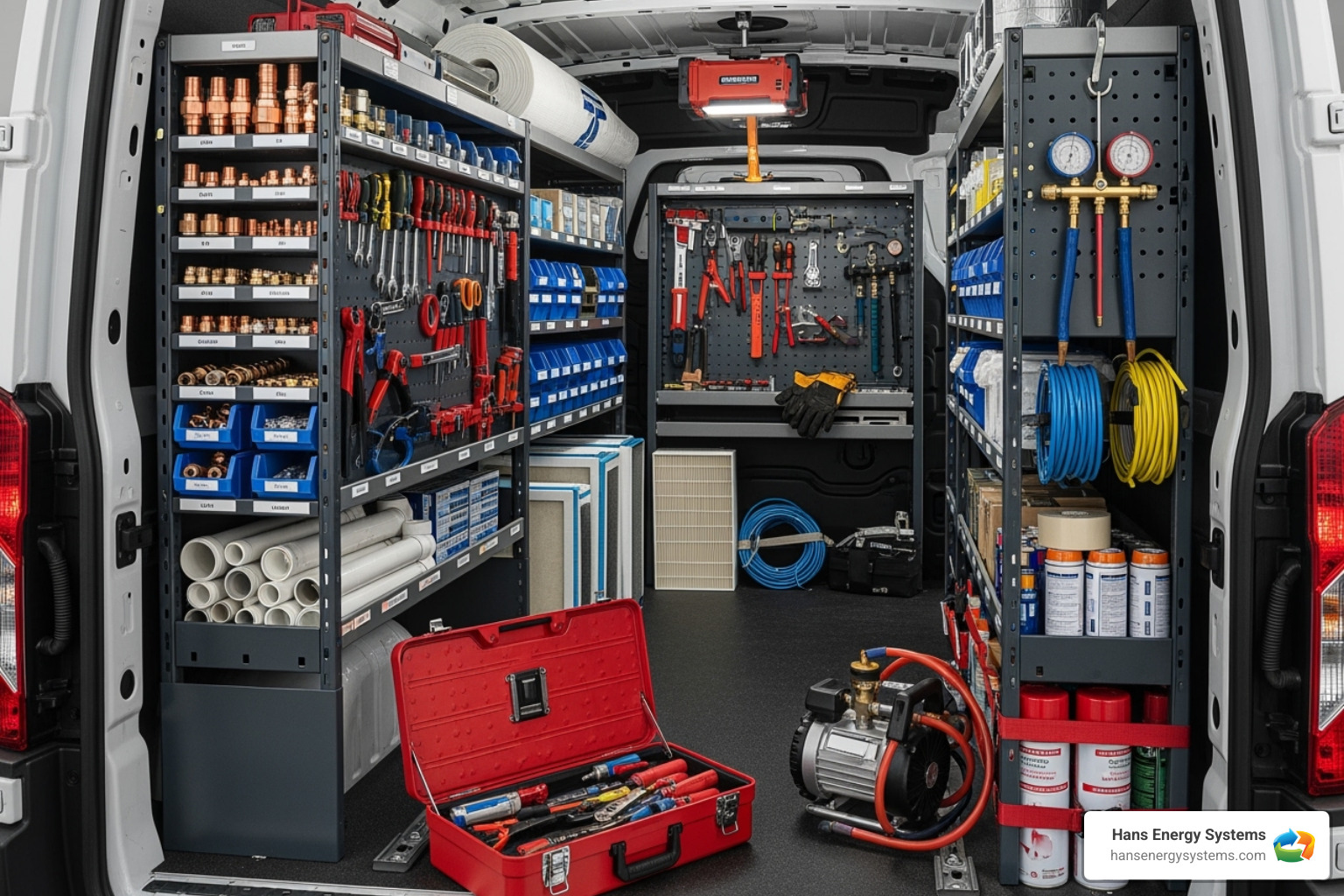
- Emergency service fees: After-hours, weekend, or holiday calls typically include a premium fee.
- Accessibility of the unit: A unit in a cramped crawlspace or attic takes more time to service than one in an accessible utility room.
We believe in transparent pricing and will always explain your options and costs upfront.
Financing Your Comfort: Options for Major Repairs or Replacement
We understand that a major heating repair or replacement doesn’t always align with your budget. That’s why we offer financing options to make comfort accessible.
- In-house financing options can spread the cost over manageable monthly payments, sometimes with special terms like interest-free periods.
- Manufacturer rebates are often available for new, high-efficiency systems, significantly reducing your out-of-pocket costs.
- Government energy efficiency incentives provide additional savings. We stay current on available programs to help you maximize your savings.
Our goal is to keep your family comfortable while working within your budget. To explore financing options, please Contact Us.
Prevention and DIY: Your First Line of Defense
Proactive maintenance is the best way to avoid costly, unexpected breakdowns. Learn the benefits of regular upkeep and simple tasks you can do yourself.
The Power of Prevention: Benefits of Regular Maintenance
Regular maintenance is the best way to avoid a sudden heating repair call. A well-tuned system is more reliable, efficient, and keeps your family comfortable while saving you money. Key benefits include:
- Improved energy efficiency: A clean, tuned system uses less energy, which leads to lower utility bills.
- Extended equipment lifespan: Proper care can help your heating system last years beyond the average 15-year lifespan.
- Improved safety and reliability: Technicians can spot potential safety hazards like gas leaks or carbon monoxide risks.
- Fewer emergency repairs: Regular maintenance catches small issues before they become major, inconvenient problems.
We recommend scheduling professional maintenance in the fall to ensure your system is ready for winter.
To learn more about keeping your system in peak condition, explore our HVAC Maintenance Plan Poway, CA.
Simple DIY Maintenance and Troubleshooting Tips
In addition to professional maintenance, several simple DIY tasks can serve as your first line of defense against heating repair emergencies.
- Check your thermostat settings: Ensure it’s set to “heat” and the temperature is set higher than the current room temperature.
- Replace air filters every 1-3 months: A dirty filter restricts airflow, forcing your system to work harder and waste energy. Check it monthly.
- Keep outdoor units clear of debris: Trim back vegetation and clear away leaves, dirt, or snow that can block airflow and reduce efficiency.
- Ensure all vents are open and unblocked: Closing vents or blocking them with furniture disrupts airflow and can cause uneven heating.
- Reset the circuit breaker: If your system stops working, try turning the breaker off for 10 minutes, then back on. This can resolve minor electrical glitches.
If these basic steps don’t solve the problem, it’s time to call in the experts.
For additional DIY guidance and tips, check out Heating Repairs You Can Do Yourself.
Finding and Choosing a Qualified HVAC Professional
Hiring the right technician is crucial for a safe and effective repair. Here’s how to vet professionals and understand the value they bring.
Why Professional Heating Repair is Non-Negotiable
While it may be tempting to tackle a heating issue yourself, heating repair involves serious safety risks with gas lines and high-voltage electricity, making professional service essential. Professionals provide:
- Accurate diagnosis: Technicians have the training and experience to identify the true root cause of a problem, saving you from costly trial-and-error fixes.
- Proper tools and genuine parts: Professionals use specialized diagnostic equipment and manufacturer-approved components that aren’t available at a hardware store.
- Warranty preservation: Using a certified professional for repairs is often required to keep your manufacturer’s warranty valid.
- Long-term solutions: We don’t just fix the immediate problem; we address underlying issues to prevent future breakdowns. Every repair includes a 90-day warranty for your peace of mind.
To understand why we are a trusted choice for homeowners, read more on Choosing Us for Heating Repair in Poway.
How to Hire the Right Heating Technician
Choosing the right professional for your heating repair is crucial. Look for a reliable, experienced, and trustworthy technician by following these steps:
- Verify licenses and insurance: This is your protection. A licensed technician meets state requirements, and insurance protects you from liability during the repair.
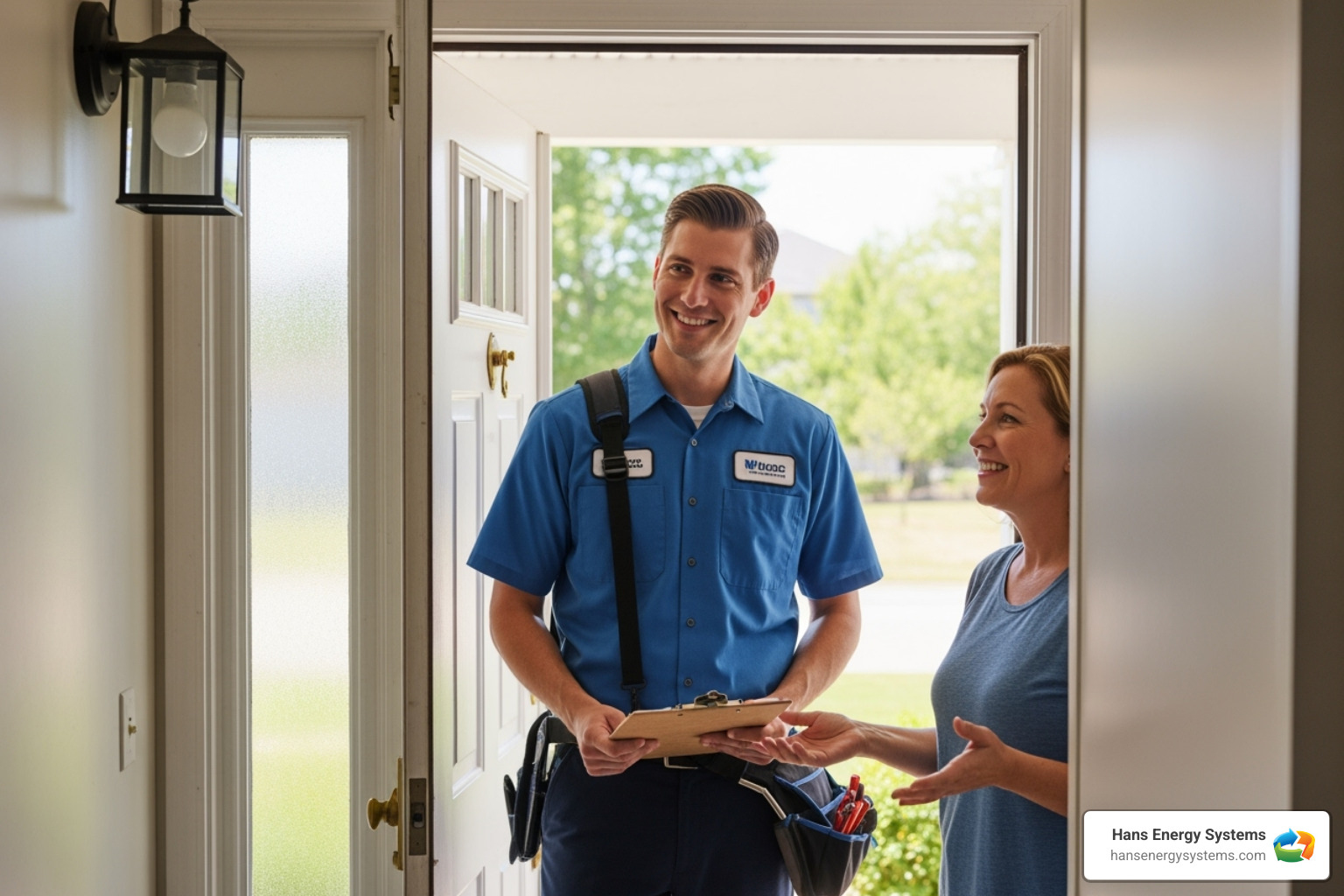
- Read recent online reviews: Platforms like Google and Yelp offer genuine insights from past customers. We’re proud of our 4.9-star rating from over 2,400 reviews.
- Ask for local references: A reputable company should have satisfied customers in your area who can speak to their experience.
- Get multiple written estimates: For major repairs, compare estimates to understand the scope of work and pricing. Be wary of prices that seem too good to be true.
- Confirm experience and certifications: Look for technicians with extensive field experience and industry certifications like NATE (North American Technician Excellence). Our craftsmen have over 20 years of experience and service almost all brands.
The right technician will explain the problem clearly, outline your options, and provide transparent pricing before starting work.
Frequently Asked Questions about Heating Systems
How often should I have my heating system serviced?
We recommend annual professional maintenance for your heating system, ideally in the fall before the heating season begins. This ensures your system runs efficiently and helps prevent unexpected heating repair needs. Regular servicing catches small problems before they become expensive, extends equipment life, and confirms safety systems are working correctly.
For more details on our comprehensive service offerings, visit HVAC Service in Poway, CA.
What should I do if my furnace is blowing cold air?
Before calling for heating repair, try these simple troubleshooting steps:
- Check your thermostat: Make sure it’s set to “HEAT” and the temperature is set higher than the current room temperature.
- Inspect the air filter: A severely clogged filter can restrict airflow and cause the furnace to shut down its burners as a safety measure. Replace it if it’s dirty.
- Check the gas supply: For a gas furnace, ensure the gas valve is on. If your system has a pilot light, check that it’s lit (follow manufacturer instructions carefully if you need to relight it).
If these steps don’t work, it’s time to call a professional to diagnose the underlying mechanical or electrical issue.
Is a noisy furnace dangerous?
A noisy furnace is a clear warning sign. While some minor sounds are normal, new or loud noises often indicate a problem that needs attention. Certain noises can signal a dangerous situation.
- Loud scraping or grinding noises often mean a serious mechanical problem, like a failing blower motor. Turn your system off immediately to prevent further damage.
- Banging or popping sounds are also concerning and could indicate ignition problems or a cracked heat exchanger. A cracked heat exchanger is a serious safety hazard, as it can leak carbon monoxide into your home. Shut the system down and call for service right away.
Don’t ignore any new, loud, or persistent strange noises. It’s always safer to have a professional technician inspect the system.
Conclusion: Your Partner for Reliable Warmth in San Diego County
Your home’s heating system is vital for creating a safe and comfortable space. By recognizing warning signs like strange noises or rising energy bills, you can address issues before they become major problems. Regular maintenance and simple DIY tasks are your first line of defense, but for issues that require professional expertise, a qualified technician is your most effective solution.
Whether you’re weighing repair versus replacement for a 15-year-old furnace or dealing with an unexpected breakdown, understanding the factors involved helps you make smart choices for your home and budget.
At Hans Energy Systems, we’ve been your neighbors in San Diego County since 2008, bringing more than 20 years of craftsman experience to every service call. We are a locally owned business committed to providing reliable, professional work. Our dedication shows in our same-day repairs in 95% of cases, 24/7 emergency service, and a 90-day warranty on repairs.
Your comfort is our priority. When winter’s chill arrives, you can count on us to keep your home warm.


